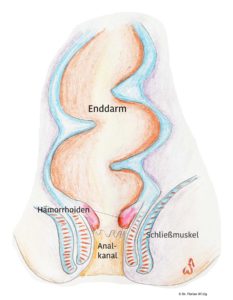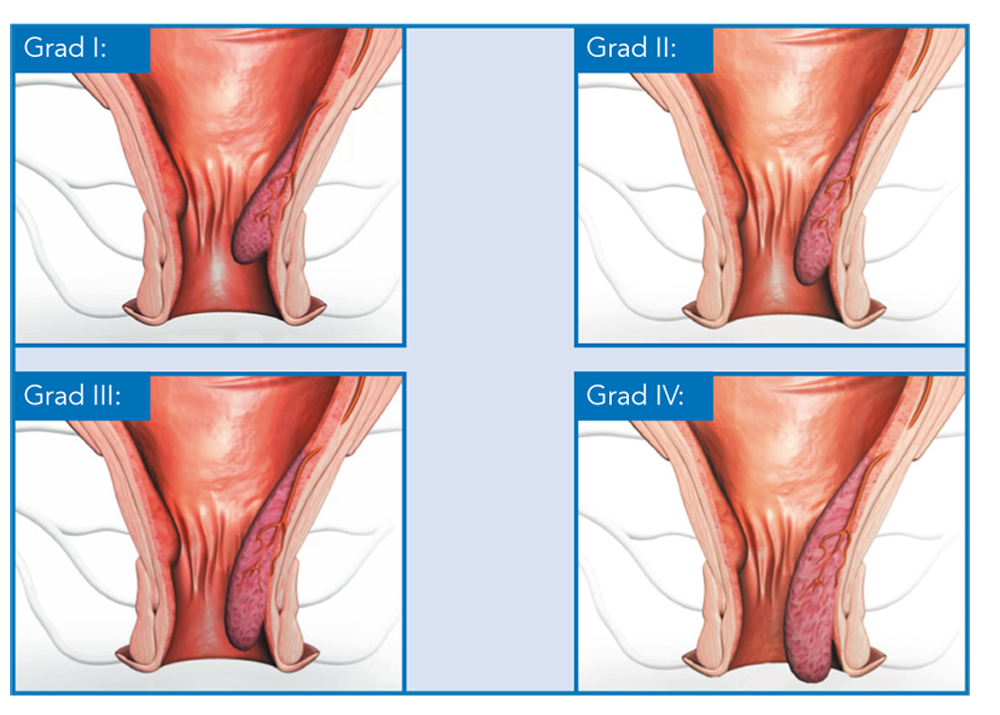Hemorrhoids
Hemorrhoids - cause and symptoms
What exactly are hemorrhoids?
Hemorrhoids are a common disease, although it must be said that we are born with them and they have an important function in fine continence, that is, sealing the rectum. They are the erectile tissue in the rectum, still above the anal canal. One speaks of a disease only when they are enlarged. This disease is called hemorrhoidal disease.
The majority of people have enlarged hemorrhoids. Every second adult has to be treated for it in the course of his life.
Reasons for pathological changes are, for example, strong pressing and long sessions during bowel movements; this causes blood to back up, which changes the vessels. But also lack of exercise, overweight, poor or one-sided diet, connective tissue weakness and also pregnancy has an influence on the condition.
Symptoms of hemorrhoids
Blood in the defecation
What does it mean? These are symptoms that may indicate hemorrhoidal disease. Bright red blood on the toilet paper, blood on the anus or blood in the stool immediately tempt many patients to think of colon cancer. In most cases, the cause is not malignant. An examination by a specialist provides certainty about the diagnosis and leads to the all-clear regarding cancer and the right treatment.
Itching at the anus
Often itching also occurs as a symptom and affects the patient more than bleeding. Itching at the anus is caused by over moisturization of the anal skin due to permanent mucus production of the pathological hemorrhoids. It can be compared to a cold, in which the skin around the nose becomes inflamed and forms eczema. The patient also feels these secretions as unpleasant sweating in the pore sometimes accompanied by stool smear. This also leads the patient to mistakenly believe that he or she is incontinent.
Pressure in the rectum or permanent urge to defecate
If they are enlarged, they press on the very sensitive anus and give the patient the feeling of an urge to defecate. This feeling increases even during or after defecation, so that he gets the impression of suffering from constipation. But strong pressing makes them swell additionally and thus has a very negative effect. This leads to a vicious circle.
Anal prolapse, protruding swollen hemorrhoids
High-grade enlargements can cause loosening of the mucous membrane in the anus. As a result, they may protrude during defecation, urination or even spontaneously in an upright position. This is not only very frightening for the patient, but also sometimes painful and accompanied by the previously mentioned symptoms such as itching, burning, bleeding as well as a feeling of pressure.

Hemorrhoids - what can be done?
Hemorrhoids are the most common cause of the symptoms listed here. However, when visiting a doctor, it is important to rule out other diseases such as anal fissures, rectal cancer (rectal carcinoma, anal carcinoma), mariscae, fistulas, anal thrombosis, allergic anal eczema, skin diseases (neurodermatitis, psoriasis) or infectious eczema (for example due to sexual contact).

Hemorrhoids treatment
Hemorrhoids should be treated according to the stage, that is, according to the extent.
What does the degree of severity in hemorrhoids mean?
- Grade I: Enlargement without prolapse accompanied by bleeding and a feeling of pressure.
- Grade II: Prolapse, i.e. prolapse during pressing. Symptoms are often itching and burning. The regression can be spontaneous.
- Grade III: Prolapse, i.e. prolapse. Symptoms: pain, oozing and fecal smear. They can be pushed back manually.
- Grade IV: Prolapse, i.e. prolapse. Symptoms are pain, feeling of pressure, weakness in holding stool (fecal incontinence). They can no longer be pushed back manually.
How are hemorrhoids treated?
We are specialized in their diagnosis and stage-appropriate as well as very gentle treatment:
- Grade I hemorrhoids are sclerosed by injecting a solution that shrinks the hemorrhoids. Here, one usually hardly feels anything.
- Grade II They are dried up by tying them with a rubber band. This method is equally painless.
- Even with grade III or grade IV, surgery with an incision can often be avoided.
A modern, gentle method is the so-called “Doppler-guided hemorrhoidal artery ligation (HAL)” and “mucopexy”, or Recto-Anal-Repair (RAR):
An ultrasound probe is used to cut off the artery supplying (too much) blood to the hemorrhoid; this “drains” the attached hemorrhoid and shrinks it. Through an additional mucopexy, i.e. “gathering suture”, enlarged hemorrhoids that are already protruding from the rectum can be additionally reduced in size and brought back into the rectum. After this “lifting” they are no longer visible on the outside.
How to find us
Proctology and surgery practice Munich, directly at the subway station Max-Weber-Platz
Einsteinstrasse 1, 81675 München
Office hours
Mon 7:00-17:00
Tues 7:00-19:00
Wed 7:00-17:00
Thu 7:00-19:00
Fri 7:00-14:00
